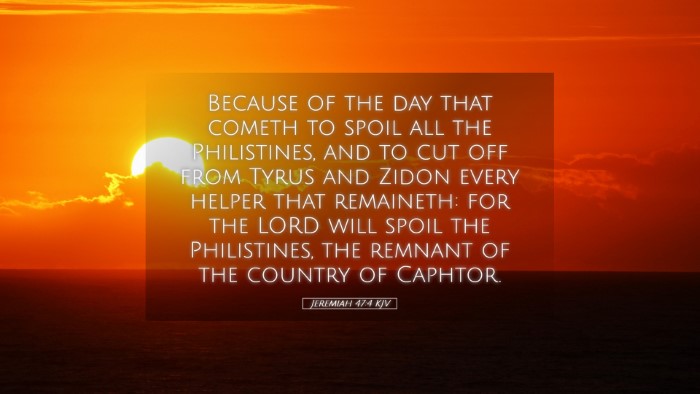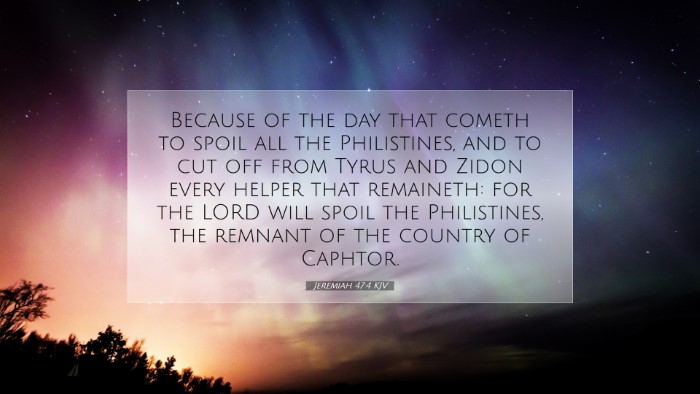Commentary on Jeremiah 47:4
Jeremiah 47:4 (ESV): "Because of the day that is coming to destroy all the Philistines, to cut off from Tyre and Sidon every helper that remains. For the Lord is destroying the Philistines, the remnant of the coastland of Caphtor."
Introduction
This verse from the book of Jeremiah is part of a prophetic oracle concerning the judgment of the Philistines. Prophetic interpretations and writings from notable commentators provide depth to our understanding of this passage. The language and imagery in this verse reflect profound themes of divine judgment and the fate of nations.
Context of Jeremiah's Prophecy
The verses surrounding Jeremiah 47 place it in a rich historical and theological context. Matthew Henry emphasizes the importance of acknowledging the specific conditions and prevailing attitudes of the people during this prophetic message. An instigator of the Lord’s wrath, the Philistines often symbolized the encroachment of idolatry and paganism against God’s covenant people.
Theological Significance
Albert Barnes extensively notes that this prophecy signals the impending destruction of the Philistines and serves as a testament to the sovereignty of God in the affairs of nations. God's judgment is portrayed not as a mere reaction to the Philistines' actions but as part of His overarching plan for justice and restoration.
Understanding the 'Day That Is Coming'
The phrase "the day that is coming" encapsulates a critical theological theme concerning eschatological judgment. Adam Clarke comments that this day forebodes calamity that is inevitable and divinely appointed. Clarke reflects on the duality of God’s character: His mercy and justice, displaying that the prophetic warning serves as both a threat and an invitation to repentance.
- Impending Judgment: The term implies urgency and a lack of escape for those who continue in disobedience.
- Divine Sovereignty: It emphasizes that God is in control of history and the destinies of nations.
Destruction of the Philistines
Jeremiah's declaration of the destruction of the Philistines reveals God’s punitive action against those who oppose His will. Henry notes that the term "destroy" represents both a physical covenant judgment against the Philistines and a metaphorical indictment against sin. The remnant of this nation, their livelihood and identity, would face erasure.
The Role of Tyre and Sidon
In this verse, Tyre and Sidon are mentioned as partners in commerce and influence, serving as a direct connection and identification of the Philistines with surrounding cultures. Barnes elaborates on the significance of these cities, linking them to historical alliances and the traded goods that fueled the material condition of the Philistine region. The demise of this cooperative influence would further leave the Philistines isolated and vulnerable.
Caphtor and Its Significance
Adam Clarke draws attention to the "coastland of Caphtor," understood as the original homeland of the Philistines, relating to the island of Crete or regions of the Aegean. The reference to Caphtor embodies the roots and extent of divine retribution. Clarke posits that the destruction of the Philistines can be seen as a retribution for their long history of enmity against Israel.
Application for Believers
This passage invites serious reflection among theologians, pastors, and scholars regarding God's unyielding justice and holiness. As the church navigates contemporary challenges and cultural pressures, the lessons from Jeremiah 47 resonate today:
- Awareness of Judgment: Similar to the Philistines, cultures reject divine principles at their peril.
- Repentance and Restoration: Calls to repentance remain central to our theological discourse.
- Hope in God's Mercy: Amidst judgment, God’s grace and mercy are always accessible to those willing to turn.
Conclusion
In summary, Jeremiah 47:4 declares the serious implications of divine judgment upon nations that defy God. The insights gathered from Matthew Henry, Albert Barnes, and Adam Clarke combine to illuminate the depth and relevance of the passage for believers today, urging an understanding of both God’s justice and mercy within our communal and individual lives.


